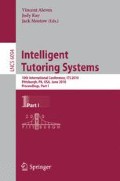Abstract
We studied the effectiveness of a math fact fluency tool integrated with an intelligent tutor as a means to improve student performance in math standardized tests. The study evaluated the impact of Math Facts Retrieval Training (MFRT) on 250 middle school students and analyzed the main effects of the training by itself and also as a supplement to the Wayang Tutoring System on easy and hard items of the test. Efficacy data shows improved student performance on tests and positive impact on mathematics learning. We also report on interaction effects of MFRT with student gender and incoming math ability.
Access this chapter
Tax calculation will be finalised at checkout
Purchases are for personal use only
Preview
Unable to display preview. Download preview PDF.
References
Geary, D.C., Hoard, M.K., Byrd-Craven, J., Nugent, L., Numtee, C.: Cognitive Mechanisms Underlying Achievement Deficits in Children With Mathematical Learning Disability. Child Development 78(4), 1343–1359 (2007)
Royer, J.M., Tronsky, L.N.: Addition practice with math disabled students improves subtraction and multiplication performance. In: Scruggs, T.E., Mastropieri, M.A. (eds.) Advances in Learning and Behavioral Disabilities, pp. 185–218. JAI Press, CT (1998)
Catsambis, S.: The path to math: Gender and racial-ethnic differences in mathematics participation from middle school to high school. Sociology of Educ. 67, 199–215 (1994)
Catsambis, S.: The gender gap in mathematics: Merely a step function? In: Gallagher, A.M., Kaufman, J.C. (eds.) Gender differences in mathematics, pp. 220–245. Cambridge University Press, Cambridge (2005)
Midgeley, C., Feldlaufer, H., Eccles, J.: Student/teacher relations and attitudes toward mathematics before and after the transition to junior high school. Child Development 60, 981–992 (1989)
Olson, L.: State Test Programs Mushroom as NCLB Mandate Kicks. In: Education Week, November 30 (2005)
Casey, M., Nuttall, R., Pezaris, E., Benbow, C.: The influence of spatial ability on gender differences in math college entrance test scores across diverse samples. Developmental Psychology 31, 697–705 (1995)
Royer, J.M., Tronsky, L.N., Chan, Y., Jackson, S.J., Marchant, H.G.: Math fact retrieval as the cognitive mechanism underlying gender differences in math test performance. Contemp. Educational Psychology 24, 181–266 (1999)
Eccles, J., Wigfield, A., Harold, R.D., Blumenfeld, P.: Age and gender differences in children’s self and task perceptions during elementary school. Child Development 64, 830–847 (1993)
Carr, M., Jessup, D.: Gender Differences in First-Grade Mathematics Strategy Use: Social and Metacognitive Influences. Journal of Ed. Psychology 89(2), 318–328 (1997)
Beal, C.R.: Boys and girls: the development of gender roles. McGraw-Hill, New York (1993)
Royer, J.M., Garofoli, L.: Cognitive contributions to sex differences in math performance. In: Gallagher, A.M., Kaufman, J.C. (eds.) Gender differences in mathematics, pp. 99–120. Cambridge University Press, Cambridge (2005)
Fletcher, J., Lyon, G., Fuchs, L., Barnes, M.: Learning disabilities: From identification to intervention. The Guilford Press, New York (2007)
Arroyo, I., Beal, C.R., Bergman, A., Lindenmuth, M., Marshall, D., Woolf, B.P.: Intelligent Tutoring for high-stakes achievement tests. In: 11th International Conference on Artificial Intelligence in Education, pp. 142–169. IOS Press, Amsterdam (2003)
Arroyo, I., Woolf, B.P., Royer, J.M., Tai, M.: Affective Gendered Learning Companions. In: 14th International Conference on Artificial Intelligence and Education, pp. 41–48. IOS Press, Amsterdam (2009)
Arroyo, I., Cooper, D.G., Burleson, W., Woolf, B.P., Muldner, K., Christopherson, R.: Emotion Sensors Go To School. In: 14th International Conference on Artificial Intelligence and Education, pp. 17–24. IOS Press, Amsterdam (2009)
Reading Success Lab, http://ReadingSuccessLab.com
Arroyo, I., Woolf, B., Muldner, K., Burleson, W., Cooper, D., Razzaq, L., Dolan, R.: The Effect of Motivational Learning Companions on Low-Achieving Students and Students with Learning Disabilities. In: Aleven, V., Kay, J., Mostow, J. (eds.) ITS 2010, Part I. LNCS, vol. 6094, pp. 327–337. Springer, Heidelberg (2010)
Author information
Authors and Affiliations
Editor information
Editors and Affiliations
Rights and permissions
Copyright information
© 2010 Springer-Verlag Berlin Heidelberg
About this paper
Cite this paper
Arroyo, I., Woolf, B.P., Royer, J.M., Tai, M., English, S. (2010). Improving Math Learning through Intelligent Tutoring and Basic Skills Training. In: Aleven, V., Kay, J., Mostow, J. (eds) Intelligent Tutoring Systems. ITS 2010. Lecture Notes in Computer Science, vol 6094. Springer, Berlin, Heidelberg. https://doi.org/10.1007/978-3-642-13388-6_46
Download citation
DOI: https://doi.org/10.1007/978-3-642-13388-6_46
Publisher Name: Springer, Berlin, Heidelberg
Print ISBN: 978-3-642-13387-9
Online ISBN: 978-3-642-13388-6
eBook Packages: Computer ScienceComputer Science (R0)

